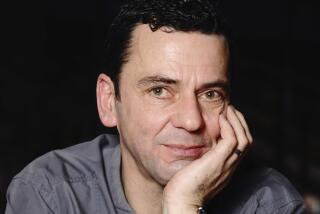‘Postman’ rings again, in German
- Share via
German writer-director Christian Petzold is terrified of flying, so he doesn’t get to the United States much. But America gets to him by way of the classic noir thrillers he grew up on, which now dig deep into his own movies. Best known in this country for his acclaimed 2007 feature “Yella,” a low-budget, character-based drama about an abused East German wife who hooks up with a venture capitalist in the West, Petzold belongs to a putative new wave of German filmmakers less interested in naive-realist explorations of national guilt for the Holocaust than in the troubled 21st century of his homeland.
“German art films right now always seem to be about dying people who want to see the sea one more time,” the 48-year-old director says by telephone from his home in Berlin. “I find Hollywood movies more complicated and respectful of the audience.” James M. Cain’s “The Postman Always Rings Twice” is Petzold’s favorite novel and Tay Garnett’s 1946 screen adaptation, starring John Garfield and Lana Turner, his all-time favorite movie. Both have deep roots in Petzold’s new film, “Jerichow,” which turns on a clumsy plot hatched between illicit lovers -- a penniless, blank-faced veteran fresh from Afghanistan and a woman disabled by a shameful secret -- to kill the woman’s husband, a successful businessman of Turkish origin on whom they both depend.
“For me, cinema is always a melodrama and a thriller,” says Petzold. “When there’s desire between two people, you must see the reason why. They have to need each other for something or someone.” Mischievously quoting the late German director Helmut Kautner, he adds, “If there’s a man and a woman, it’s about a family. If there are two men and a woman, it’s about society.”
“Jerichow’s” doomed love triangle is corrupted by the need for money, and it’s significant that, though all three parties are paranoid, needy souls trying to buy a passage to happiness, only the Turk, brilliantly played by Hilmi Sozer, shows vitality and loyalty to family and friends. The two native Germans are empty vessels, hollowed out by want and the lack of sustaining friends or family. However unspoken, race lies at the heart of “Jerichow,” and the end of the movie, when the name “Ali” is murmured in sorrow, is at least in part a nod to Germany’s great interpreter of social malaise, Rainer Werner Fassbinder.
Like “Yella,” Jerichow unfolds in a semi-rural backwater of the former East Germany where Petzold’s parents were raised, a region that never recovered from World War II or the devastation of its factory economy after the collapse of the Berlin Wall. “These towns are like German cities from the 1920s, but they’re empty and there’s no money and no work,” Petzold says. “In Germany, many adults work with toy trains and build romantic forest landscapes.” The terrain of “Jerichow,” he says, resembles that landscape and, as in “Yella,” it’s a tale of romantic desire warped by the desire for cash. As in “Yella,” too, the emotionally crippled wannabe femme fatale is played by German theater star Nina Hoss, whose blond tresses, huge dark eyes and mobile features seem made for movies of suspicion and mistrust.
Both “Yella” and “Jerichow” have done well at the box office in Germany. “The distributors are now friendly,” says Petzold dryly, “and I get coffee every time.” (“Jerichow” opened Friday in Los Angeles.)
The timely themes of passion born of hard economic times may have helped win a commercial release for both movies in this country, and perhaps if Petzold conquers his fear of flying, he’ll take some meetings in Hollywood with dinner thrown in, and become the go-to guy for American recession noir.
--
More to Read
Only good movies
Get the Indie Focus newsletter, Mark Olsen's weekly guide to the world of cinema.
You may occasionally receive promotional content from the Los Angeles Times.










